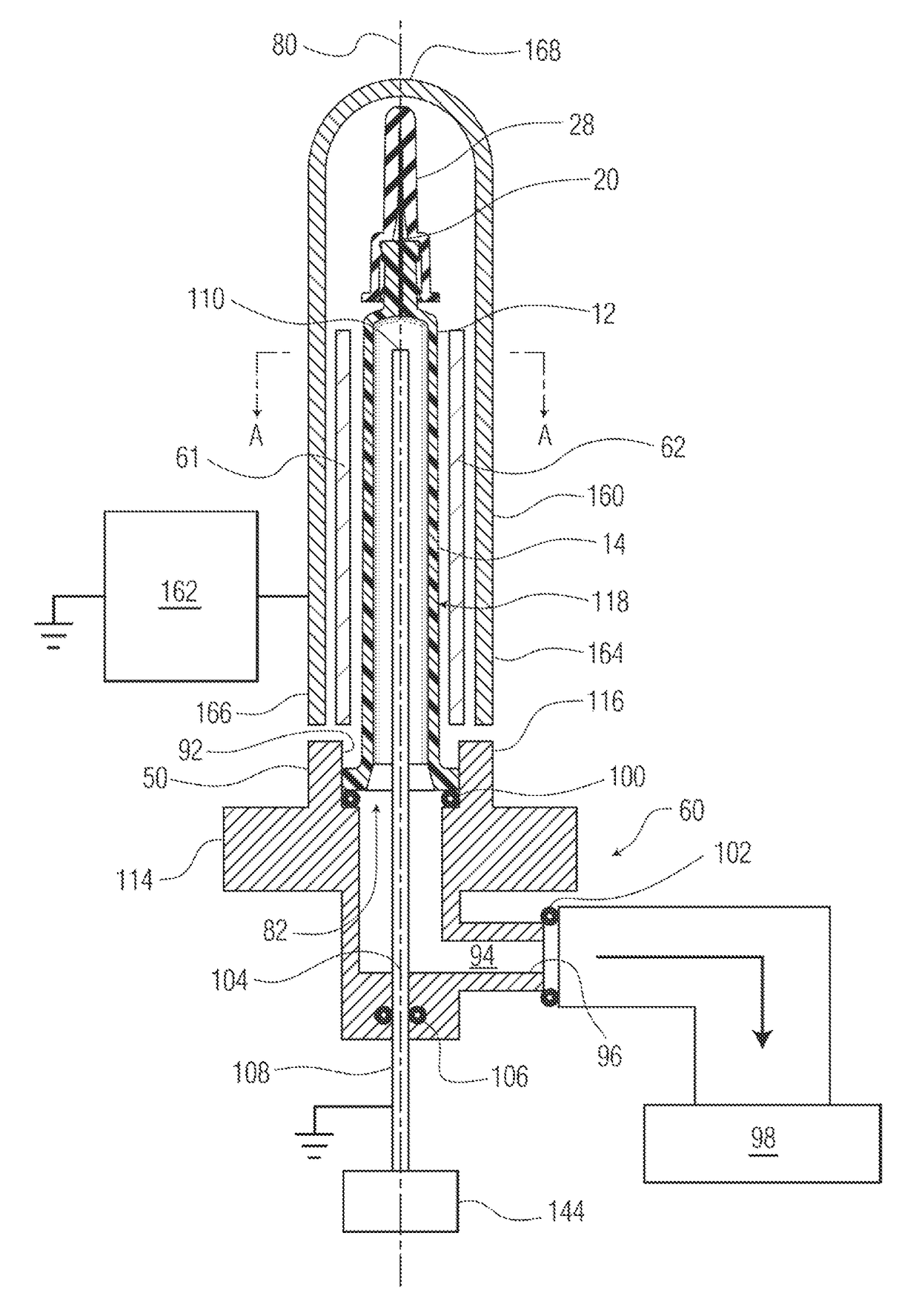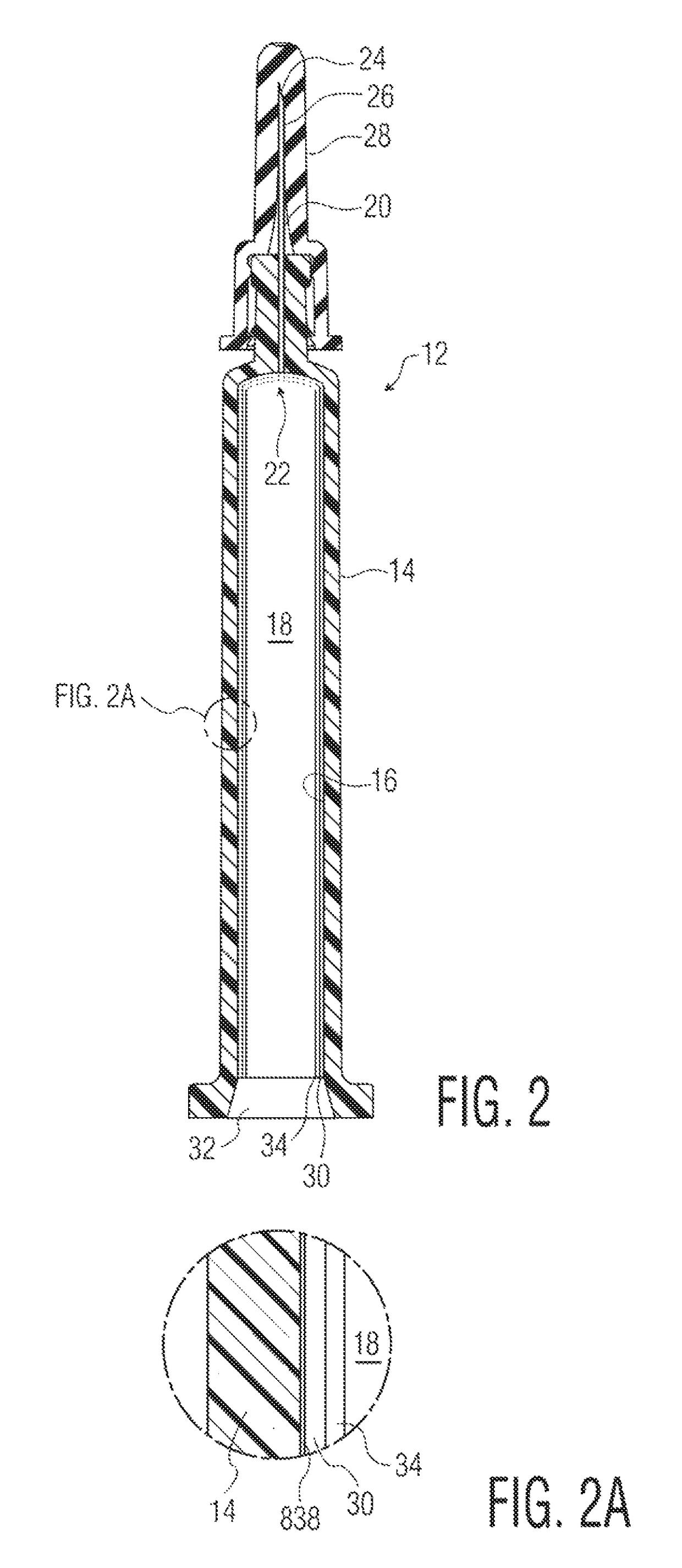Controlling the uniformity of PECVD deposition
a technology of uniformity and pecvd, applied in the field of coating surfaces, can solve the problems of non-uniform surface chemistry at the molecular level, damage to stored materials, and failure of syringes in the market, and achieve the effect of improving uniformity, density, or density
- Summary
- Abstract
- Description
- Claims
- Application Information
AI Technical Summary
Benefits of technology
Problems solved by technology
Method used
Image
Examples
working examples
Comparative Example 1
Thickness Profile for pH-Protective Coating or Layer
[2240]A pH protective coating (e.g. 34) was applied to the surface (16) of the wall of a syringe. The gas inlet used was provided with the 90-degree perforation pattern shown in FIG. 26. The external electrode was a solid metallic tube. The protocol provided above was generally followed, using 30 Watts of RF energy, OMCTS as a precursor at a flow rate of 2 sccm, argon as a diluent at a flow rate of 20 sccm, oxygen gas as an oxidizing gas at a flow rate of 0.5 sccm, and a continuous plasma energization time of 10 sec. No magnets were used in this example.
[2241]The shelf life or rate of dissolution of the pH protective coating in 0.1 M KOH was measured, and found to be 127 days for the complete coating. A plot of the coating thickness as a function of the position on a cylindrical portion of the syringe barrel is provided as FIG. 30. The plot shows a region of very thick deposition at about 50 degrees around the ...
example 2
Thickness Profile for pH-Protective Coating or Layer
[2246]A pH protective coating (e.g. 34) was applied to the surface (16) of the wall of a syringe. The gas inlet used was provided with the 120-degree or triangular perforation pattern shown in FIG. 27. The protocol provided above was generally followed, using 20 Watts of RF energy, OMCTS as a precursor at a flow rate of 2 sccm, argon as a diluent at a flow rate of 20 sccm, oxygen gas as an oxidizing gas at a flow rate of 0.5 sccm, and a continuous plasma energization time of 5 sec. A stationary quadrupole magnet array using ceramic magnets, generally as shown in FIGS. 4-5, was used, as was a wire mesh electrode.
[2247]The shelf life or rate of dissolution of the pH protective coating in 0.1 M KOH was measured. The coating did not dissolve in standard 0.1 M KOH. A plot of the coating thickness as a function of the position on a cylindrical portion of the syringe barrel is provided as FIG. 31. The plot shows more uniform deposition of...
example 3
Thickness Profile for pH-Protective Coating or Layer
[2251]A pH protective coating (e.g. 34) was applied to the surface (16) of the wall of a syringe. The gas inlet used was provided with the 45-degree or spiral perforation pattern shown in FIG. 28. The protocol provided above was generally followed, using 20 Watts of RF energy, OMCTS as a precursor at a flow rate of 2 sccm, argon as a diluent at a flow rate of 20 sccm, oxygen gas as an oxidizing gas at a flow rate of 0.5 sccm, and a continuous plasma energization time of 10 sec. A stationary quadrupole magnet array using neodymium-iron-boron (NDFeB or neodymium) magnets, generally as shown in FIGS. 4-5, was used, as was a wire mesh electrode.
[2252]A plot of the coating thickness as a function of the position on a cylindrical portion of the syringe barrel is provided as FIG. 32. The plot shows more uniform deposition of the coating, with isolated regions of thicker deposition across the height at about 0 and 180 degrees around the ci...
PUM
| Property | Measurement | Unit |
|---|---|---|
| thickness | aaaaa | aaaaa |
| temperatures | aaaaa | aaaaa |
| pressure | aaaaa | aaaaa |
Abstract
Description
Claims
Application Information
 Login to View More
Login to View More - R&D
- Intellectual Property
- Life Sciences
- Materials
- Tech Scout
- Unparalleled Data Quality
- Higher Quality Content
- 60% Fewer Hallucinations
Browse by: Latest US Patents, China's latest patents, Technical Efficacy Thesaurus, Application Domain, Technology Topic, Popular Technical Reports.
© 2025 PatSnap. All rights reserved.Legal|Privacy policy|Modern Slavery Act Transparency Statement|Sitemap|About US| Contact US: help@patsnap.com



